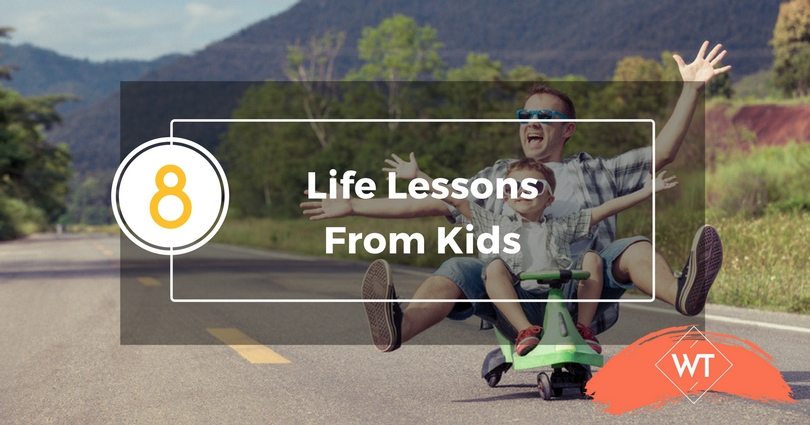8 Life Lessons From Kids

Grown-ups never understand anything by themselves, and it is tiresome for children to be always and forever explaining things to them. ~ Antoine de Saint-Exupery (Tweet this)
Folk wisdom says that we learn nothing new but remember what we have once known and forgotten. I truly believe this, which is why I also think that we have so much to learn from children because they remind us of what we once knew but have forgotten.
Life lessons from kids
Here are eight life lessons from kids that can teach us how to be happy and live a peaceful life, if we pay enough attention.
1. The world is a playground
Just look at them at play. There are driven by the joy of discovering a new world. Everything is an opportunity for creating fun. Everything is fresh and inspires them to experiment and try out new things. This freshness and excitement is what drives them.
The world is a playground—an incubator or laboratory to create fantastic things. We forgot this as we grew up. In reality this is what life is: One big opportunity to create. Our nature and purpose is to be creators. We drowned it by stacking up rules, fears, limits and inhibitions.
Children constantly remind us what we came here to do—create and remember how to play the game of life.
Children aren’t coloring books. You don’t get to fill them with your favorite colors. ~ Khaled Hosseini (Tweet this)
2. It’s all about excitement
What few people know is that our goal is not really happiness but excitement. Happiness is a by-product of excitement. Children can show us this. Excitement motivates us, gives us the energy to go through difficulties and adversities. It elevates us to the frequency of joy.
Children buzz with excitement. They are lead by it instead of suppressing it. When they are excited they are absorbed single-mindedly into the process of whatever they are doing. They can easily switch from feeling annoyed, frustrated or sad to feeling completely excited about something else that catches their imagination.
3. Creativity through play
All that children want—or the young of any species for that matter—is to play. Play is the vehicle that sparks the imagination and allows the creative juices to flow through. As adults we block or suppress our creative faculties because we forgot the power of play.
We dulled the mind with many tight rules and expectations about the world. What we can learn from children is that with more play in our lives, we can truly manifest a better world based on authentic and creative solutions rather than dull and limited views of the same old problems.
4. Resilience
Children are highly adaptive and flexible which makes them resilient. When a child meets an obstacle or failure, he or she is not stunned or demoralized—at least not for long. She will either try again with fresh new enthusiasm or hop on to another idea, quickly forgetting the setback a moment before.
Sometimes I observe kids at play. They come up with a plan or idea and they are all buzzing around with excitement. Then they learn that some part of their grand plan faces a practical obstacle. Their excitement dips—ooohh! Then someone comes up with an alternative or a completely new idea and suddenly the excitement of the group skyrockets again. They have completely forgotten the little tragedy.
This is not so with us adults. When we face obstacles in life our mind gets stuck in the problem for too long, even when a new solution presents itself (or else we just miss the solution because of the very fact that the mind is locked on the problem). We fail to see fresh alternatives like children often do.
5. The power of forgetting and forgiving
I’ve heard so many people say “I forget but do not forgive” or “I forgive but do not forget.” I never really understood either expression. Having one without the other is like taking a shower with your clothes on. It defeats the purpose.
Children teach us differently. They can easily both forget and forgive. They don’t keep things hanging heavily on their hearts. They still bear the lightness of being. So why do we do that to ourselves? I mean why do we deliberately choose to keep a heavy heart? What’s the win? What’s the benefit?
6. Letting go
The natural companion to forgetting and forgiving is letting go. You cannot do both without letting go of the baggage that drags you down. Letting go is not hard; we only make it so. The obvious truth is that letting go is lightening up—being lighter and allowing more light to shine on your problems.
Children find it much easier to let go because they have less complexes and baggage to cling on to which brings me to the next point.
7. Zen mind
Some people say that children have a Zen mind because they have a ‘beginner’s mind.’ I cannot agree more. The classical Zen allegory of the full cup is a perfect example. You cannot fill your cup with new stuff when it’s already full just as you cannot acquire fresh new ideas and perspectives when you mind is already full with preconceptions, beliefs and expectations about the world.
Your hard disk becomes full with installed programs. You need to clean it up a bit in order to be able to accommodate fresh new information about the world and yourself. Children are always excited because they have so many new things to discover. When the mind is full, the world becomes empty and dull.
8. Putting in your all
When children do something they are excited about, they are completely absorbed in the task at hand. They put in their all without exclusion—even if for a brief moment. They are motivated and their mind is not preoccupied with a hundred other things.
As adults we find that increasingly hard to do. We might be doing something but our mind might be diluted over other concerns in the background. You might say that’s obvious since as adults we have more responsibilities to answer to. Maybe so, but we still have the option to commit our energy and attention to one task at a time. It’s a habit that can be relearned. Yes, for children it comes more naturally.
Yet whether it comes naturally or has to be nurtured is not the point. The point is that giving our 100% to something is an ideal to be pursued as it creates more quality output in whatever we do while training the mind to operate more effectively. In practice, it also results in better time management and a good exercise in self-discipline and in organizing our tasks better.
Life is too short. Make these life lessons from kids a part of your routine and see the transformation!









Leave a Reply